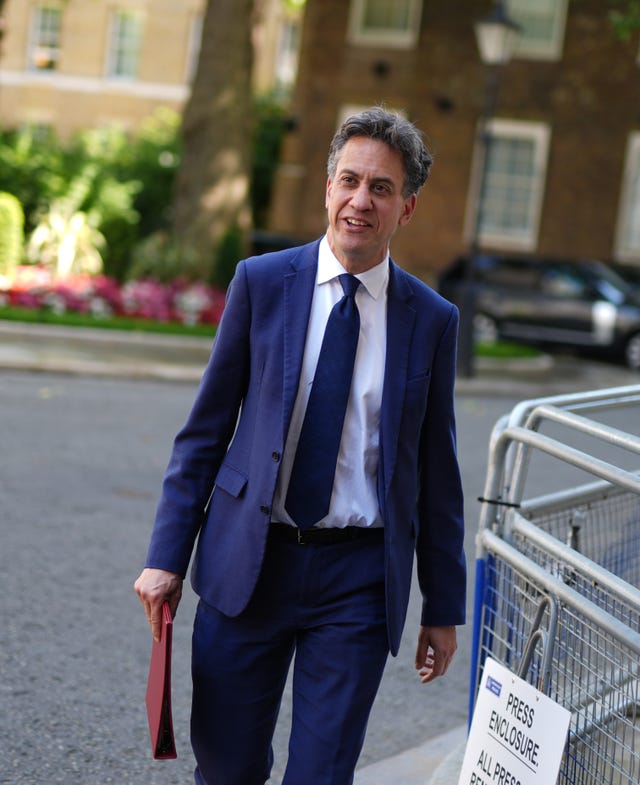The British Government has secured 9.6 gigawatts (GW) of renewable power across 131 projects in its flagship auction for green energy schemes.
While the number of projects is a new record, previous auctions have brought more capacity. In 2022, the Government announced 11GW of winning bids for various renewable technologies.
The latest round of contracts includes nine new offshore wind farms, compared to none last year, including what will be Europe’s largest and second largest wind farm projects – Hornsea 3 and Hornsea 4 off the Yorkshire coast.
It also includes a combined 115 solar and onshore wind projects, which is more than the total number of projects delivered in the last auction round.
The Department for Energy Security and Net Zero said the new clean power projects would generate enough electricity to power 11 million homes.

Energy Secretary Ed Miliband said the auction had got the offshore industry “back on its feet,” adding that the projects are “essential to give energy security to families across the country”.
He said: “It is another significant step forward in our mission for clean power by 2030 – bringing Britain energy independence and lower bills for good.”
“This auction has produced a record number of solar projects bolstering our mission for a solar revolution, we have powered forward with onshore wind, secured the largest commercial floating offshore wind project in the world and got the offshore industry back on its feet.”
Guaranteed rates
The so-called Contracts for Difference (CfC) auctions were started in 2015 as the Government’s mechanism for making sure renewable energy projects are built.
Because renewable projects can be expensive, developers bid to secure a guaranteed rate – or strike price – their project will get for every megawatt hour (MWh) of energy it produces in the coming years.
If the price of electricity on the open market dips below that, subsidies will kick in to top up payments to companies. If the price is higher, companies have to pay back the difference.
The auction comes after the Government scrapped a de facto ban on onshore wind farms earlier this month, reversing planning measures brought in for England by the Conservatives in 2015 under David Cameron.
It also follows the formation of Great British Energy, a state-owned energy investment firm which will target £8.3 billion of funding at renewable power projects.
The Government came in for criticism on Tuesday after the total generation capacity of the auction was lower than previous years, while offshore wind projects totalled just 5GW, lower than the 7GW in 2022.
It is roughly half of what is required each year to meet the Government’s target of 50GW of new offshore wind by 2030.
Offshore turnaround
Ami McCarthy, Greenpeace UK’s political campaigner, said: “This urgently needs to be followed up with a much bigger auction next year, as well as investment for faster grid connections, better planning, and more storage to hold the green power for when it’s needed.”
Nonetheless, the auction results mark a turnaround for offshore wind projects in particular, after no contracts were awarded for the industry last year.
Since the auctions started in 2015, offshore wind has boomed, with the price of developing projects falling and output skyrocketing.
In 2015’s auction, 1GW of offshore wind contracts were agreed. By the fourth round, in 2022, it was 7GW.
Over that period, the strike price for those contracts dropped by almost 70% thanks to market confidence generated by Government help, and economies of scale.
But last year’s fifth round of CfD saw no new offshore wind development contracts agreed, after no companies submitted bids to build them because the strike price was set too low.
The lack of offshore wind projects in 2023 was a setback for the previous government, which had committed to having 50GW of offshore wind by 2050.
As well as the Hornsea projects, the latest auction round includes the largest floating offshore wind project in the world to reach the market, Green Volt, which is double the size of Europe’s total installed floating offshore wind capacity.
It also includes six new tidal projects.
‘Back on track’
In a statement on Tuesday, energy company ScottishPower said it had successfully bid for 1.1GW of offshore wind, enough green energy for over one million UK homes, across its East Anglia Two and East Anglia Three projects.
Chief executive Keith Anderson said: “Offshore wind is back on track after last year’s misstep which is great news for consumers. The only solution to weaning the UK off volatile fossil fuels which are the root cause of increasing bills is more clean, green energy.
“This auction’s success shows this tried and tested investment mechanism, replicated globally, delivers exactly the scale of action needed, with billions of pounds to be pumped into the British economy replacing ageing, polluting infrastructure.
“Now the Government and GB Energy should focus efforts on supporting new green technologies to unleash their potential, replicate offshore wind’s success and deliver on their ambition of making Britain a clean energy global superpower.”













